- Home
- Jane Smiley
Ordinary Love and Good Will Page 13
Ordinary Love and Good Will Read online
Page 13
“Fine. Mr. Miller, I feel like—”
I put my finger to my lips. “Don’t say it. The fact is, I live in a weird way and I make people feel funny. But the most important thing is that Tom live through the consequences of those moments when he was breaking the dolls. If you make it easier for me, that will make it easier for him. It can’t be easy for him, or he won’t learn the real lesson.”
“That’s true.”
“Thanks.” We have backed toward the door. She reaches behind me to open it, and I glance around one last time, with the sensation of looking into a Russian Easter egg—the scene, bejeweled with light, is impossibly lovely and self-contained, impossibly unattainable. Her hand on the figured brass doorknob is slim, strong, beautifully manicured, a hand, I realize, that is unlike any hand I’ve looked at in years, right beneath my gaze, but as far away as a hand in a magazine advertisement. I am disconcerted; then I am on the porch. It is cold and I pull up the hood of my sweatshirt. The hood string broke long ago, and to replace it, Liz crocheted one from some yarn she’d spun. She hung tassels from it. Tying them fills me with longing for her, and I hunch my shoulders and hurry down the porch steps.
The next four days constitute an orderly demonstration to Tommy of the consequences of his actions. When Martin Summerbee stops by for a visit, I sell him part of the lamb for $26.50. Tommy is standing there. I take him with me when I walk into town on Saturday, looking for a ride to State College, and he watches while I promise a friend of Liz’s, Dinah Hart, to till her flower beds one morning in May. “Tom will help,” I say. We wait on the porch without speaking while she gets ready to go. The “Jem” dolls are at the far end of the Walmart toy department, requiring a longing march through all the aisles of Transformers, games, art supplies, Legos. He reacts to it all in little starts of recognition, probably with much the same enchantment that I felt in Dr. Harris’s lamp-bejeweled front hall. In the doll section, “Kimber” and “Jem” are right on the top, anticlimactic in every way, an obvious waste of money, of effort, of the lambs and the affection and care they represented. I say, “I’m sorry that we have to spend our money on these dolls, Tommy. If you hadn’t broken Annabel’s, we wouldn’t have to.”
“I know,” he says, chastened, and after that I don’t save him by hastening him to the checkout and out the door. I let him look, but not touch. This might have backfired. When we are standing in the vestibule waiting for Dinah, he mutters, “We wouldn’t have bought anything, anyway.”
I am calm, paternal. I kneel and turn him toward me. His hair is dark brown and springy, his eyes round and thickly lashed. Though he is lanky and slender, his cheeks are round and cherubic. He looks at me, I search his face, and I find no defiance. I say, “Tom, having money and spending money or not is our choice, but wasting it takes our choice away. Do you realize that?”
“Yes, Daddy.”
And then Dinah pulls up and I have to believe him. On Monday he takes the dolls to school, and around the place he is helpful and interested, same as always. On Wednesday he brings home another note, this on a half-sheet of peach-colored stationery engraved, “Lydia Martin Harris.” It reads,
Dear Mr. and Mrs. Miller,
Annabel is very pleased with the dolls. Thank you for taking such good care of her. Incidents such as this can easily become disasters. It was your prompt and responsible reaction that prevented that in this case. I am new in Moreton, but I hope you will consider me a friend.
Yours truly,
Lydia Harris
And I do. That night the air is especially clear, and when Liz is looking down the valley at Moreton, she says, “Can you pick out the house?”
It takes us a while, and at first we think not—it is hidden by the flank of Snowy Top. But no; Laurel Creek Road curves around the mountain a ways after the Harris place. It is there, its lights seeming to flicker as the breeze tosses about the leafless branches in front of the house. After we find it, Liz says, “Fanlight above the door, you say?”
“Sidelights, too. Even curved windows aren’t hard to frame up, you know.”
“Ooooh.” Liz says. “Mmmm. Let’s.”
“Miller takeover bid?”
“Miller Conglomerate Expands Holdings Once Again.”
“Miller Fanlight Has Wall Street Worried—Can Millers Be Stopped?”
Liz gives a peal of laughter and rolls back on the bed, her feet in the air. “Ha!” she says. “We are so greedy. People don’t know how greedy we are.” She takes off her overalls, and the moonlight through the window lays a flat, pearly triangle over her thigh, attaching it to the quilt, so that all I want to do is burrow into layers and layers of comfort and warmth and strength and softness. “Come on,” she whispers, “come on.”
3. November
On the Monday before Thanksgiving, I come into the kitchen for lunch, and Liz tells me that she has been saved. She is smiling, her eyes are sparkling, she looks very flushed and attractive, and so I believe her. After a few moments of confusion, I sit down at the table. I don’t know whether to pick up one of my library books from the shelf beside the table, whether to wait for my lunch, or whether to go back out to the barn for a while. I do not, right this minute, want to hear about the circumstances of her salvation, but I am not surprised. Maybe a cancer diagnosis is like this—mortality is expected, but the date comes as a shock.
When I was in the army, I had a buddy named Larry Strunk. We were inducted the same day, trained in the same boot camp, given the same job, and sent to the same unit. For a while we shared the same hooch, and a few times we went on patrol together. In our own minds, our fates became superstitiously entwined, and we even called ourselves “the brothers,” only half facetiously. He went out one day and lost his left leg in a mine explosion. Afterward one of my regrets was that we had dared fate by twinning ourselves, however innocently, however jokingly, that we had doomed ourselves to divergence by naming aloud the coincidences and similarities, and feelings of affection that had been felt but could have gone unspoken. When I married Liz, I recognized the same magic at work. Now, at the table, it seems to me that she has taken off the way he did, leaving me alone with the old, good life. Certainly she doesn’t see it that way.
She says, “I made sweet-potato soup, and there’s sprout bread and cream cheese. I’m starving. It looks delicious.”
“I want to ask you, but right now wanting to ask you feels sort of like wanting to ask you for all the sexual details of some love affair. Can I wait to ask you until I feel more friendly about it?”
“I would like to tell you.”
She speaks simply, with such pure desire to communicate that my heart constricts. We have had great luck in finding one another; we have few conflicts and much pleasure in our friendship; we have been held securely in this bowl of a valley; how can I deny her? I say, “Okay. The moment itself. Make me see the moment itself.”
“I was chopping sweet potatoes and looking down the valley. The fog was sort of caught halfway up the mountainsides, as if tangled in the branches, and then it lifted off in big scarves, and the sun shone on the tree branches, and I saw the shapes of the trees, one right after another. Well, the outline of the lower branches exactly matched this imaginary line created along the tips of the upper branches, and it was beautiful and uniform—all the trees were like that. And I thought, The roots are like that, too. Then I thought, Why shouldn’t all that striving be toward God’s love? Why shouldn’t it be God’s love that makes it beautiful? The whole history of culture tells us that it is God’s love. Why not just accept it, believe it? Why not? It seemed easy. So I did. It was.”
“Sweetie, the world is beautiful. It’s beautiful because it and our eyes have evolved together.”
“I still believe in Evolution.”
“Can’t you not be saved? Can’t you just believe in God and everything and not be saved?”
“But it feels like being saved. I feel full of relief.”
I eat my soup. I could say wha
t I feel, “Don’t leave me,” but she would think I meant something practical. I know she won’t leave the farm, our marriage. I know, in fact, that this latest event represents the completion of that circle to her. I have been in love with Liz for twelve years, and our love grew largely out of shared interests, ideas, and ambitions. We have disagreed and compromised and learned from one another, and one of the things I love most about her is how she suggests new possibilities to me after the moment of anger as if they were speculations rather than issues. She is respectful of everyone, including Tom, including me. She makes it easy to learn from her. But being saved religiously is not something I want to learn, that is in me to learn. Nor, I suspect, is it something learnable, but, rather, a native talent. I could probably learn the formalities, but I could never make the leap of faith. Liz won’t see it neutrally, like this; she will certainly move willy-nilly toward giving that talent a moral color, using words like “choice,” “commitment,” “good,” “necessary.” Her “Bright Light” church doesn’t admit enough room for compromise, if any form of Christianity does.
She scarfs down her soup and two or three pieces of bread, not really more lustily than usual—she is a passionate eater most of the time. Then she sits back and says, “Bobby, this is good news.”
“On what plane?”
She smiles merrily. “How about the every-little-sparrow-that-falls plane?”
“God is happy?”
“I think so. I think he’s happy but not elated, sort of the way you are when you plant lettuce seeds and they sprout, rather than as you would be if you planted lemon trees in Pennsylvania and they bore fruit. I don’t imagine it’s a miracle for him.”
“Is it a miracle for you?”
She gets up from her seat and plunks herself in my lap. “Only for me. It feels very private. I like it that way. Nothing is going to change. It makes me love you more.”
Well, it is easy to notice the foolishness of the transported, the sorts of promises they make, their unwillingness to admit the practical cost soon to be paid, their self-confidence. So let me not notice it, as Liz has not rolled her eyes in the past at my “great ideas.” Let us stay married, nuzzling, agreeing, eating, talking, being all the more present now that we recognize transience in a new way.
On Wednesday morning I go for the turkey. The fact is, I’ve gotten one every year so far, though more than once it’s taken from sunup to sunset. Turkeys are easier to hunt in the spring, when they are mating. You can go out before dawn and find them roosting in the trees, silhouetted against the lightening sky, and you can call them down to you at daybreak with a hen call, and often the tom will come at a run. In the fall their desires are more discreet—food and friendship—and they are far more suspicious. You have to call infrequently, no more than two or three times an hour, and, I always think, your call has to sound rather casual, relaxed but informative, as if the turkey you are is offering good conversation about safe and pleasant topics. You also have to stay as still as possible, since their hearing is exceptional and their eyesight is better than that. With all your efforts, a turkey in the fall still approaches mistrustfully, a step at a time, so you have time to debate over and over about whether it is in range or not, whether you are a decent shot or not, whether you’ve been kidding yourself all year about your marksmanship, whether you have also been kidding yourself about lots of other things, whether now is the time to give up meat-eating, whether you are cold and uncomfortable enough to go home—but still you are riveted, can’t move, enthralled by your power over the turkey.
A flock has included the back part of our woods in its range this year: I have seen tracks and feeding signs all summer. I intend to outsmart the birds this year, and not to spend as much time as usual doing it. At the breakfast table, Tommy says, “Hey, Daddy, aren’t you going to get a turkey this year?”
“It’ll be here when you get home from school.” I sound lordly.
He looks around the room. “You said you’ve to jump them when they’re still sleepy.”
“That’s the spring. Don’t worry. I’ve got those turkeys all figured out this year.”
“Famous last words,” remarks Liz.
“Keep talking. We’ll see.”
Liz laughs. “How about a nice turkey breast molded out of mashed turnips? Mmm.”
“I want turkey!”
“And there is a turkey who wants you. You watch. Now, here, how many shells do I have in my hand?”
“Three.”
“That’s all I’m taking. One to scatter the flock, one to kill the dinner bird, and one to fiddle with in my pocket for good luck.”
He picks up one of the shells. They are my last three from a box I bought four years ago. I say, “Better still, you keep that for good luck all day at school.”
“Good luck if you want cream cheese for Thanksgiving dinner,” snorts Liz.
Tommy is grinning as he slips the shell into his breast pocket. I say, “Now don’t show it to anyone. Otherwise the luck will run out of it, and we won’t have turkey for Thanksgiving. Got that?”
“Yeah. Yeah, I guess.”
“It’s our secret? Promise?”
“Promise.”
“Two-shot-turkey promise?”
“Yeah.”
“The look” passes over him; he clenches his palm and one or two breaths come suddenly and fast, but he is good—he puckers and blows off the extra energy, waits a second, and then goes back to eating his toast. I feel as if I have just witnessed a private ritual exorcism, and I don’t want to lay claim to it by mentioning it, so after a little bit I say, “It’ll be great. I’ll be thinking of you, son.”
The trees are hung with mist, and the cloud cover is low enough to shroud the upper ridges—a good day for hunting, since the damp leaves under my feet make little noise as I climb the hill behind the house. At “the deer clearing” (a spot where we used to see deer once or twice a week), I pause, as I always do, and look over the roof of the house, down the valley. The roof of the house is blackly wet, mostly hidden in a tangle of branches. Our gardens, fenced, covered with leaves, make a neat pattern, attentive to the house, like seats in an amphitheater. Moreton is hidden in thick mist. It would be an ugly day anywhere else, but here it is only a particular kind of day, autumnal and interior. It feels adventurous to be out.
I check the springhouse and the water pipe. The clear, still water, dark in the shady springhouse tank, is about three feet deep. A steady trickle of water flows into it from above—rather than using a pipe, I took a chisel, and chiseled a deep conduit in a flat piece of sandstone that was already in place. I thought it was an especially tactful way of capping the spring. From the tank, buried pipe runs to the pump by the sink in the house. Buried four feet deep. The trench took Martin Summerbee and me a summer to dig, but it has never frozen up, even in the coldest winter. The spring produces about a gallon a minute, even in the summer, and gives me the secret security of buried treasure—when I bought the land, I thought I would use the old well, but I discovered the first summer that its lower reaches were caved in and that digging a new well, if the driller could even get in to the house, would run about a thousand dollars—eight hundred more than I had. It was the well-driller who said he’d heard there were springs all over this ridge. The fact is, I used to think that the pleasure of receiving the earth’s free gifts—water, raspberries, firewood, walnuts—would fade with habit, but it hasn’t. That’s another prayer—good luck that feels like gratitude.
I cross the ridge onto the neighboring property, and encounter turkey sign almost immediately. It is not only tracks, but also the shadowy, rounded shapes in the dirt that they make with their wattles as they forage. I put the call to my mouth and give two quiet “cluck”s. A turkey answers almost immediately, from a cleft not far below me, where I happen to know that a spring rises and a clearing spreads in a gentle slope toward an old deer-blind. Between me and the clearing is a heavy thicket of young sugar maples and yellow birch. A turk
ey won’t enter a thicket, so I can use it as a blind from which to look down at the spring. I load one of the shells, take the safety off, and glide toward the thicket.
The turkeys are feeding in a group near the spring, the tom, three hens, and two young birds. When I stretch out on a big flat rock and give a single cluck, the two young birds come toward me at once, five or six steps. The nearest hen looks up curiously, too. She is my target, a twelve- or thirteen-pound bird, probably not very old. I take aim. She continues to look around. Through the sights she seems larger, and seems to take on personality. I choose her, as if I were choosing the smartest, most alert puppy from a litter. I squeeze the trigger, willing myself to resist the recoil and the noise of the shot.
By the time the thunder has dissipated, the turkeys have scattered into the woods, nowhere to be seen. In a heap of feathers near the spring lies not the little hen but the tom himself, who must have walked into the shot, which I must have misjudged because I was shooting downhill. I have never felt a sense of triumph at actually bagging the game, rather a kind of panic at having to approach it, touch it. There is a heart-sinking moment like exhaustion when I think of all the work ahead of me: gutting, dressing, trudging home, singeing, cooking, even eating, and wish I were still in that happy, unencumbered previctorious state.
It is carrying the bird home through the trees, tromping through the leaves, surveying the landscape that brings me back to myself. And, of course, Liz is impressed. It isn’t even lunchtime yet, and this is the biggest turkey I’ve ever shot.
At three-thirty, we hear the school bus gear up as it pulls away from dropping Tommy at the end of the road. We have left the feathers on the turkey for just this moment. Liz hastily spreads the wings on newspapers on the front porch, to display them, and we hide inside the kitchen door. The turkey seems about six feet long, so large that it is nearly human in some way. I can’t resist peering out and spying on my son’s progress toward the house—it is a weakness I have always had for wanting to know the solitary, undefended Tom. At first his step is idle—he drops his coat, steps on it by mistake, hastily picks it up and brushes at the dirt. Then he makes himself be more careful. At last he decides to run. About ten feet in front of the porch he stops short, startled and, maybe, afraid for a moment. He cranes his neck to get a better look at the turkey, realizes what it is, and climbs the steps. His awe is everything I could have asked for. “Wow,” he says. “It’s the turkey.” He walks all the way around it, fingers some of the wing feathers, pokes the beak, picks up one of the feet. I can feel Liz tense for jumping up and shouting, “Surprise!” but I restrain her, and we keep watching. He stands back then and gazes at the turkey, arms crossed over his chest. He gazes for a long time, much longer than I would have thought possible for him. This is a fidgety kid, one who can hardly stand to read for half an hour in his room, who has to be asked to sit down at the table over and over during a meal. Now, though, he seems to be drinking this turkey in. No toe-tapping, head-scratching, sniffling. Nothing. When I become impatient, Liz restrains me. And then he steps forward and strokes the turkey’s breast with the back of his hand, gently, three times. He reaches toward the turkey’s head. We can’t stand it any longer—neither of us—we spring up and yell, “Surprise!” He jumps back, laughs, becomes a son again, says, “Daddy! You got it!”

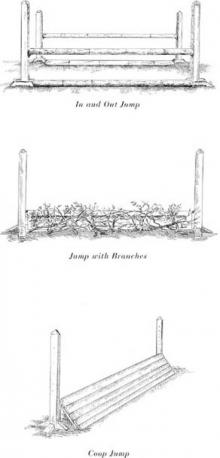 The Georges and the Jewels
The Georges and the Jewels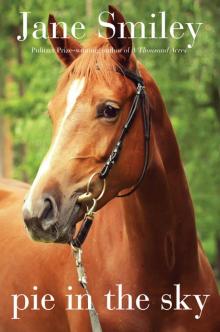 Pie in the Sky: Book Four of the Horses of Oak Valley Ranch
Pie in the Sky: Book Four of the Horses of Oak Valley Ranch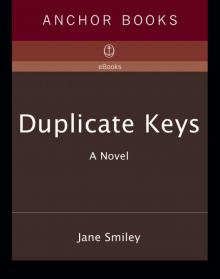 Duplicate Keys
Duplicate Keys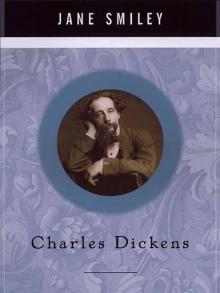 Charles Dickens
Charles Dickens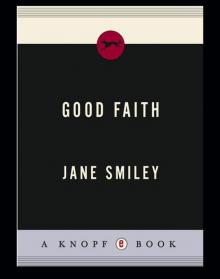 Good Faith
Good Faith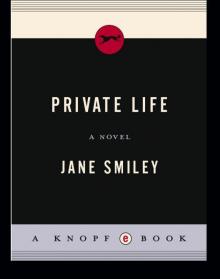 Private Life
Private Life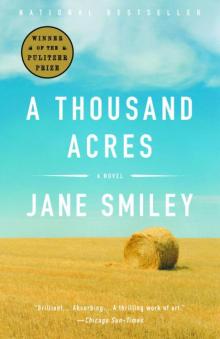 A Thousand Acres: A Novel
A Thousand Acres: A Novel The Greenlanders
The Greenlanders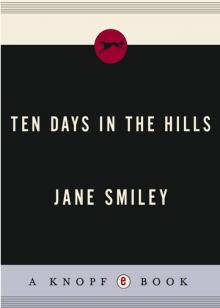 Ten Days in the Hills
Ten Days in the Hills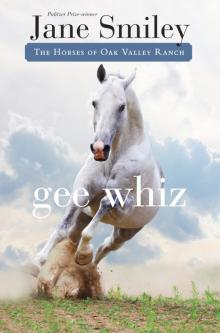 Gee Whiz: Book Five of the Horses of Oak Valley Ranch
Gee Whiz: Book Five of the Horses of Oak Valley Ranch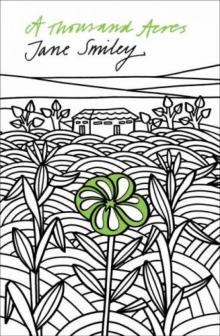 A Thousand Acres
A Thousand Acres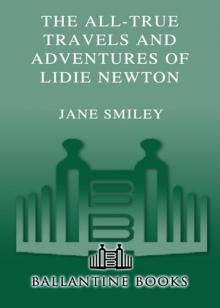 The All-True Travels and Adventures of Lidie Newton
The All-True Travels and Adventures of Lidie Newton Ordinary Love and Good Will
Ordinary Love and Good Will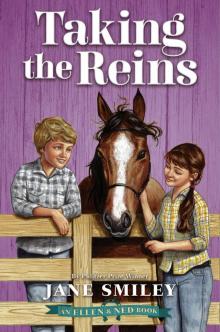 Taking the Reins (An Ellen & Ned Book)
Taking the Reins (An Ellen & Ned Book)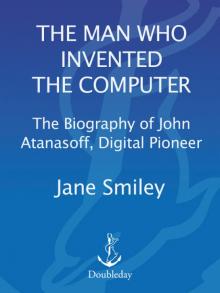 The Man Who Invented the Computer
The Man Who Invented the Computer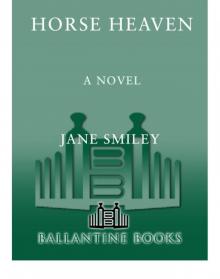 Horse Heaven
Horse Heaven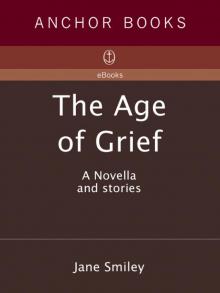 The Age of Grief
The Age of Grief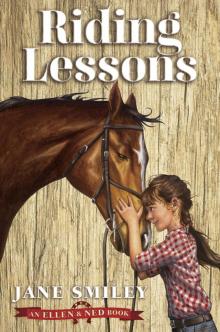 Riding Lessons
Riding Lessons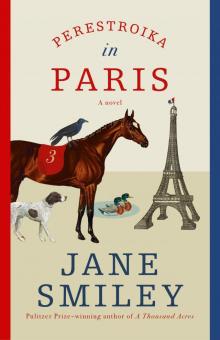 Perestroika in Paris
Perestroika in Paris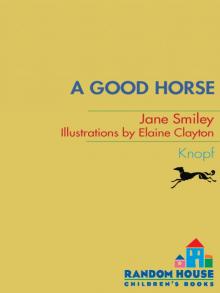 A Good Horse: Book Two of the Horses of Oak Valley Ranch
A Good Horse: Book Two of the Horses of Oak Valley Ranch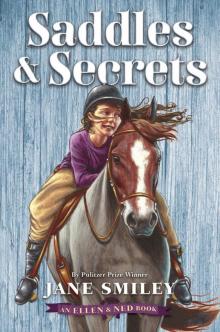 Saddles & Secrets (An Ellen & Ned Book)
Saddles & Secrets (An Ellen & Ned Book)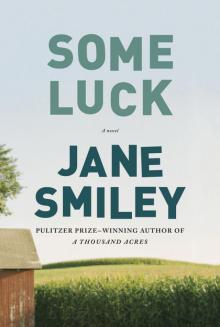 Some Luck: A Novel
Some Luck: A Novel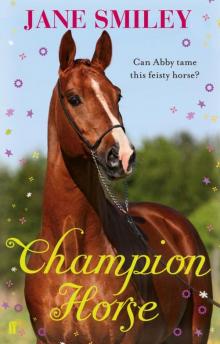 Champion Horse
Champion Horse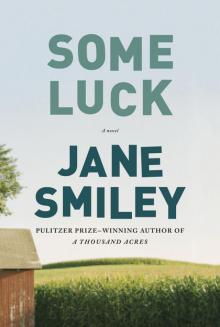 Some Luck
Some Luck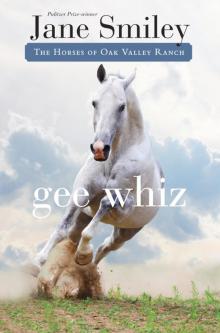 Gee Whiz
Gee Whiz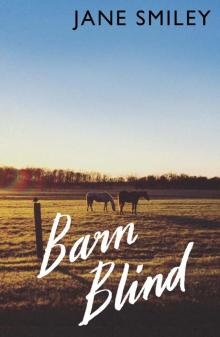 Barn Blind
Barn Blind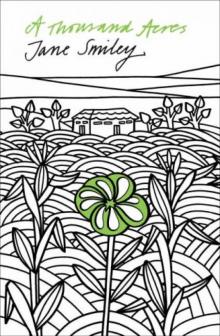 A Thousand Acres (1992 Pulitzer Prize)
A Thousand Acres (1992 Pulitzer Prize)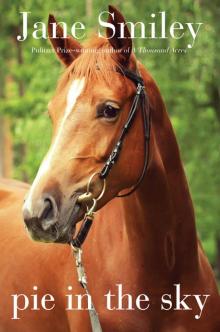 Pie in the Sky
Pie in the Sky True Blue
True Blue A Thousand Acres_A Novel
A Thousand Acres_A Novel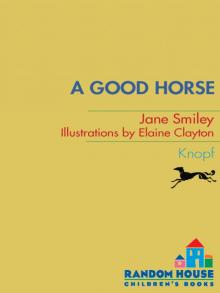 A Good Horse
A Good Horse